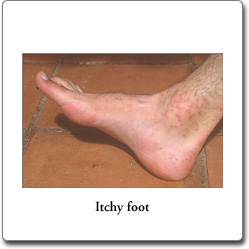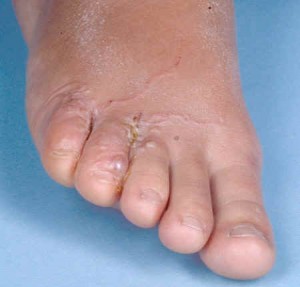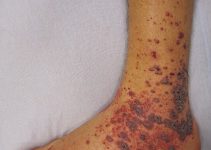What does Itchy Feet Mean?
Page Contents

Picture 1 – Itchy Foot
Source – wildherps
The irritation caused by any kind of skin infection leading to the inflammation of the feet and the constant urge to scratch and itch the area concerned is known as Itchy Feet. It is a condition that can also be observed at the hands and toes. Itchy feet and hands are although quite a common condition that may happen to anyone and everyone, its persistency may be a reason of concern which may aggravate to cause a condition characterized by extremely itchy skin.
Itchy Feet Symptoms
The symptoms of itchy feet as the very term of the disease suggests is mild or persistent and severe itching of the feet and the toes as well. Mostly triggered by a bacterial or fungal infection, it is also characterized by the inflammation of the feet and an urge to scratch and itch the feet constantly. However, the symptoms of itchy feet may be accompanied with the symptoms of other skin diseases such as ringworm or metabolic diseases such as Diabetes. Incessant itching may also lead the sensitive skin to bleed.
What causes Itchy Feet?
Normally any kind of contact of the skin with bacterial or viral agents of infection can cause one to itch the skin in an insane manner. The most common reason behind itchy feet is the sweating of the feet and the moistening of the same due to wearing a shoe or socks for a prolonged period of time. Such unhygienic ways of living make life uncomfortable for most of us. There are further causes of itchy feet that may be categorized as under:-
Athlete’s Foot
The fungi named Tinea pedis is responsible for causing the skin disease which is not only commonly sighted among athletes but also among all of us. The most significant causes for athlete’s foot are the wet and humid environment within which has to work. The constant exposure of the feet to water leads to the occurrence of an infection triggered by Tinea pedis. The wearing of stuffy shoes also causes further skin abrasions. The disease may also spread if one shares contaminated shoes, or uses an unhygienic public toilet. Itchy feet after bath or after shower are mostly caused when one uses a public bathroom. The most discernable symptoms for athlete’s foot is the irritable itching of the skin belonging to the soles, upper parts or sides of the foot, or between toes and the occurrence of itchy feet blisters as well. It is also accompanied by the reddening of the area, soreness, dampness, development of cracks or the peeling off of the skin belonging to the same.
Tungiasis

Picture 2 – Itchy Painful Rash
Source – mcgill
This disease is characterized by an extremely itchy feet rash that is caused by a contagious pathogen called the Tunga penetrans that dwell in moist soil. It is mostly contracted when one walks barefoot in the rural muddy soil. The rash is painful in nature and heals within two weeks if taken proper care of.
Pitted Keratolysis
Excessive perspiration causes the emergence of small and shallow cavities over the soles of the feet or the palm of the hands. Such a condition is called Keratolysis. It causes the feet to itch.
Contact Dermatitis
The inflammation of the skin causing it to scratch and itch is known as dermatitis. The development of rashes on the skin is a characteristic feature of contact dermatitis. It causes skin irritation with constant exposure to extraneous factors and agents. It is of several types such as irritant dermatitis and allergic dermatitis which is triggered by irritant or an allergic substance.
Acroangiodermatitis is also a type of dermatitis that causes red itchy feet accompanied with the occurrence of purplish patches and ulcers over the affected area. Vessel disorders lead to the formation of lesions which actually result from hindered and impaired flow of blood to the feet and toes. These lesions are actually very itchy in nature and quite painful as well. Palmoplantar Keratoderma is also a condition that is associated with dermatitis that causes the skin of the palms and the soles to thicken and cause different vagaries of skin disorders.
Juvenile Plantar Dermatosis
Also known as Sweaty Sock Syndrome is supposed to be triggered by the constant friction of the feet with the uncomfortable shoe. It is a reason for itchy feet in children who already suffer from atopic dermatitis. It is signaled by the development of cracks that lead to dry, reddened or very cracked itchy feet. Such cracks are painful in nature and it also contributes to sore itchy feet.
Cutaneus Larva Migrans
It is a form of parasitic skin infection that is caused by the act of walking on sand or moist soil barefoot. Cutaneus Larva Migrans is a typical phenomenon of the tropical and subtropical regions and is also known by other names such as Ground Itch or Creeping Eruption. Itchy rash can be the reason behind burning and hot itchy feet and hands.
Scabies
The encroachment of the skin surface by the tiny itch mite is highly responsible for causing itchy feet and hands at night. The mite crawls underneath the skin surface and reproduces within. It is also responsible for giving rise to intensely itchy feet rash. Due to this hot itchy feet at night is not just the problem that one suffers from but one may also be perturbed by scabies in other parts of the body which is actually contagious in nature. Intense itching may also trigger itchy feet blisters to develop.
Besides these above mentioned causes for itchy feet, diabetes and itchy feet may also go hand in hand as several diabetic complications give rise to conditions related to body itching. Such problems associated with the immune system are primarily responsible for dry and cracked itchy feet.
Itchy Feet in Pregnancy
Itchy feet during pregnancy are a common problem that afflicts most women. Although the problem is quite common, it causes a great deal of discomfort as itchy feet is quite irritating. Itchy feet and hands during pregnancy are actually caused by the enlargement and the stretching of the uterus while pregnancy is in progression. Another cause for not only itchy feet and hands but the entire body may be the release of sex hormones or enzymes by the liver during pregnancy.
In case of Pruritic Urticarial Papules of Pregnancy (PUPP), this is a medical condition that characterizes the occurrence of itchy bumps on the stomach or the development of rashes on the skin. It basically occurs during the trimester of pregnancy and causes great discomfort to the pregnant mother. This is a mild condition that normally does not harm women but may be a cause of concern if the itching remains unabated. Extremely itchy feet may cause Cholestasis, a rare condition characterized by the accumulation of the bile salt in the body. The itching is so severe at times that it forces pregnant women to even scratch and itch the affected area to such an extent that it may bleed.
It is a common belief that women who suffer from cholestasis are actually at a greater risk of pregnancy. On a severe note, this condition is also responsible for causing maternal or fetal hemorrhage, fetal distress, premature labor pain, still birth or even intrauterine death of the baby. Such cases are truly critical in nature and need to be dealt in a very careful and trained manner.
Itchy Feet and Diabetes
Itchiness of feet, especially at night, is a common complaint among diabetics. As many as 33% people suffering from diabetes also suffer from a skin condition. Such a skin disease may be the cause of foot itchiness. Some other possible factors include:
Peripheral neuropathy
It is a dysfunction of nerves and is a common cause for foot itchiness in diabetic individuals. Tingling, tremors, numbness and pins-and-needles can be other associated discomforting sensations.
Fungal infections
Fungal infections such as Athlete’s foot usually arise with an acute itchy red rash on the skin between the toes. In diabetics, toenail fungus is also common and is identified by yellowing and thickening of nails with crumbly edges.
Liver failure
Liver disorders with obstruction of bile commonly give rise to itchiness. It is not known why this occurs although it has been theorized that the possible accumulation of bile salts under the skin may result in itchiness on the palms of hands and the soles of feet.
Itchy Feet with No Rash
In some cases, patients may suffer from itchiness in their feet without the presence of any accompanying rashes. The underlying diseases for such conditions may include the following:
Lymphoma
It is a cancerous condition of the blood that arises in the lymphatic system and may occur as either a Hodgkin or non-Hodgkin lymphoma. Apart from itchiness without rash, it may also give rise to other problems like fatigue, fever, weight loss and swollen lymph nodes.
Cholestasis
It is a liver disorder occurring in the late stages of pregnancy. In this condition, there is an excess of bile acids in the liver which then flows into the bloodstream of sufferers. Itchiness without rash is a common symptom of this disorder, particularly in regions like the hands and the feet.
Kidney failure
A failure of the kidneys due to underlying disorders such as high blood pressure or diabetes may leads to Acidosis in the late stages and result in itchiness.
What Causes Itchy Swollen Feet?
In many cases, feet may get itchy as well as swollen. This can be due to a variety of factors, such as:
- Underlying disorders, like allergies, topical infection/irritation, skin disorders and joint conditions
- Improper circulation of blood to feet
- Use of very tight footwear, leading to reduced flow of blood
- Fluid buildup in feet
- Any allergic reaction
Medical attention should be sought on an immediate basis at the sight of itchy, inflamed feet.
Itchy Burning Feet
Many people also experience burning sensations in their feet, apart from the discomforting symptoms of itchiness. This can result from poor lifestyle as well as certain medical conditions. A mild fungal infection known as Athlete’s foot is a common cause for such problems. Patients may also experience pain in feet, apart from itchiness and burning sensations. Diabetes and gout are two other conditions that can lead to these problems.
Wearing ill-fitting shoes can be another possible cause for the problem. Extremely tight footwear compresses the nerves in feet and other adjoining tissue, which can cause burning and itchy sensations in feet.
Itchy Feet after Shower
As aforesaid, itchiness of feet may also occur after taking a shower. This can happen if you have taken a long shower in hot water. Hot water removes all traces of oil that are naturally produced by the skin and leaves it in a dry state. Dry skin may feel itchy and tight. This can be countered by lowering the heat and taking a shower for a shorter span of time. Application of a moisturizer on the dry skin may also reduce the itchiness.
Itchy Feet Treatment
For those who desperately want to know how to stop or rather get rid of itchy feet since it is causing them a great measure of annoyance and irritation, they must first take into consideration the exact cause of itchy feet as different causes have been assigned different treatments. In other words a proper diagnosis is essential for availing a proper treatment for itchy feet.
For itchy feet caused by Athlete’s Foot, the treatment lies in washing the feet with an anti-bacterial soap. One should remember to dry the feet after taking a shower. Further, one should apply anti-fungal cream or powder available over the counter along with the prescribed ointment or pill on the affected area. This shall help in absorbing excess moisture. As a matter of maintaining personal hygiene, one must wear cotton socks but must change socks regularly as it prevents one from suffering from sweaty itchy feet.
In case of Tungiasis, the flea causing the itch may be removed physically or the application of anti-parasitic ointments may help. Pitted Keratolysis may be treated by the application of antibiotic ointments. On the other hand, dermatitis can best be dealt with cod compresses, topical steroids and hydrocortisone. However, for acroangiodermatitis, the treatment depends on the effective correction of disorder that latently causes the same.
The disease called the Sweaty Sock Syndrome that causes itchy feet does not have a specific treatment as such but is usually dealt with the application of separate ointments for the day and the evening. As a preventive measure, one should wear well fitted shoes so as to avoid any kind of friction of feet or toes.
Cutaneous Larva Migrans can be treated by the application of anti-parasitic drugs like thiabendazole on the affected area. It helps in killing the parasites and healing the skin lesions that was triggered by the excessive itching of the feet. And Scabies can be treated with either a scabicide or a cream that prescribed by the podiatrist.
Home Remedies for Itchy Feet
Certain home remedial measures can be enough to address minor itchiness in feet. These include:
Using an anti-fungal cream
Use of such creams can prevent or cure fungal infection of the skin between the toes and eliminate the sensations of itching over time.
Use of herbs
Herbs like Tea tree oil, licorice, garlic and turmeric have natural antifungal properties and can reduce itchiness of feet due to various ailments.
Use of light footwear
Use of footwear that are not tight and fit just well are perfect for your feet. This measure can ensure that the circulation in your feet is not hampered in any way.
However, persistent cases of itchiness that fail to resolve with these measures should be reported immediately to doctors for quick diagnosis and effective cure.
Application of vinegar
One can treat itchy feet at home by applying white vinegar to the affected feet. Drying the feet with a hair dryer after taking a bath helps both in preventing as well as treating itchy feet. In place of the vinegar, one may also use hydrogen peroxide which shall help restrict the occurrence of any kind of bacterial or fungal infection.
Use of Essential oils
Itchy feet bath in water mixed with small amounts of rosemary essential oils or peppermint helps in healing itchy feet lesions or blisters. One can also opt for going for a pedicure treatment with a solution of the above mentioned items with a slight modification of substituting rosemary oils with lavender oils. Foot massage or bath of the same kind helps in the effective treatment for itchy feet.
Use of moisture absorbing substances
As an alternative, moisture absorbing substances such as cornstarch or talcum powder can be sprinkled to the feet and the toes before putting the feet into the shoe.
Maintaining good hygiene
The best treatment for any kind of infectious disease such as itchy feet basically lies in maintaining ones personal hygiene. Since it is a contagious disease, one should be careful as not to wear shoes that belong to others. Direct contact of any kind with mud and sand or with the socks and shoes of an infected person should be strictly avoided. For treating severe cases of itchy feet that turn calm nights into nightmares and is also a cause of social embarrassment, one must abide by the prescription and suggestion of a podiatrist.
References :


When i applied vinegar it eases the itchiness but nit smell good i guess i acquire it when i was pedicured by woman in Calapan port i jst notice uses dirty hand towel but i jst ignored it..
I had suffered from non-Hodgkin lymphoma about 7 years ago and it took a while to finally feel myself again, however years later i tend to sometimes still get the symptoms of itchy feet again. what is the real reason behind this please?
I am a type 2 diabetic and suffer every night to itchiness to the soles of both feet. The pain goes when my feet touch the cold floor. Do you have any suggestions?
I wish I new mine too I’m gonna try white vinegar after I shower and use antibacterial soap hopefully it will help good luck
My feet and palm itch a lot night and day, no rashes. The itching gives me sweet feelings but it needs to stop. How do I stop? Tried vinegar no success.